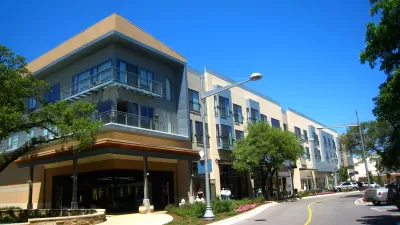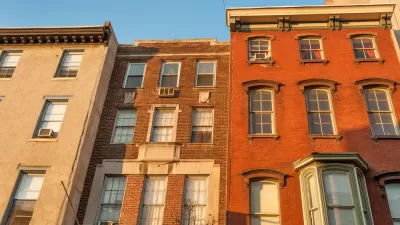In an unusual move, Austin's housing authority is buying apartments on the private market to rent to Housing Choice Voucher holders.

Low-income households everywhere face an uphill battle acquiring and using Housing Choice Vouchers to offset their housing costs. But in Texas, where landlords can reject voucher holders based on their source of income, prospective tenants struggle even more.
To expand the pool of housing available to voucher holders, the Housing Authority of the City of Austin "is continuing to expand a strategy of acquiring housing units on the private market and making some of them affordable for low and moderate-income people," Jared Brey writes.
The authority's most recent acquisition is The Bridge at Asher Apartments, a 452-unit complex located in Southeast Austin. The project "is pushing into more valuable real-estate territory than a lot of the Authority's other projects," according to the authority's president and CEO Michael Gerber.
Along with the Housing Authority of the City of Austin, several other housing authorities have experimented with purchases on the open market to supplement their inventories, including the King County Housing Authority in Washington. This move by the Austin authority follows the city's passage of Affordability Unlocked, a plan to offer density bonuses and other loosened regulations to projects serving tenants who earn under 60 percent of the median income.
FULL STORY: Austin Housing Authority Buys Private Apartments to Rent to Section 8 Tenants

Trump Administration Could Effectively End Housing Voucher Program
Federal officials are eyeing major cuts to the Section 8 program that helps millions of low-income households pay rent.

Planetizen Federal Action Tracker
A weekly monitor of how Trump’s orders and actions are impacting planners and planning in America.

Ken Jennings Launches Transit Web Series
The Jeopardy champ wants you to ride public transit.

Rebuilding Smarter: How LA County Is Guiding Fire-Ravaged Communities Toward Resilience
Los Angeles County is leading a coordinated effort to help fire-impacted communities rebuild with resilience by providing recovery resources, promoting fire-wise design, and aligning reconstruction with broader sustainability and climate goals.

When Borders Blur: Regional Collaboration in Action
As regional challenges outgrow city boundaries, “When Borders Blur” explores how cross-jurisdictional collaboration can drive smarter, more resilient urban planning, sharing real-world lessons from thriving partnerships across North America.

Philadelphia Is Expanding its Network of Roundabouts
Roundabouts are widely shown to decrease traffic speed, reduce congestion, and improve efficiency.
Urban Design for Planners 1: Software Tools
This six-course series explores essential urban design concepts using open source software and equips planners with the tools they need to participate fully in the urban design process.
Planning for Universal Design
Learn the tools for implementing Universal Design in planning regulations.
Ada County Highway District
Clanton & Associates, Inc.
Jessamine County Fiscal Court
Institute for Housing and Urban Development Studies (IHS)
City of Grandview
Harvard GSD Executive Education
Toledo-Lucas County Plan Commissions
Salt Lake City
NYU Wagner Graduate School of Public Service





























